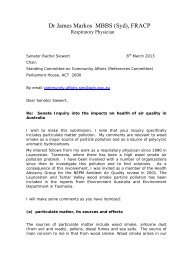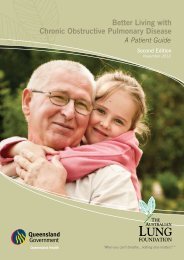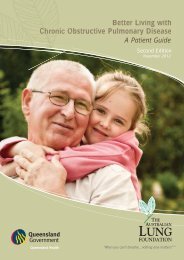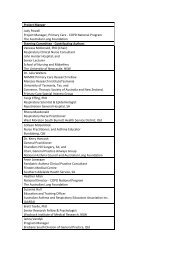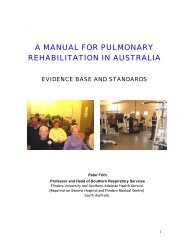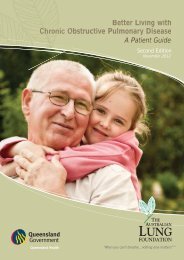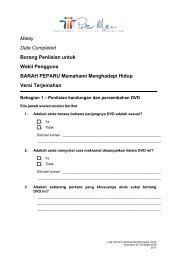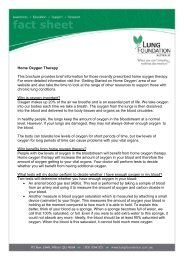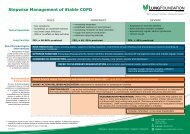Better Living with COPD - Australian Lung Foundation
Better Living with COPD - Australian Lung Foundation
Better Living with COPD - Australian Lung Foundation
Create successful ePaper yourself
Turn your PDF publications into a flip-book with our unique Google optimized e-Paper software.
<strong>Better</strong> <strong>Living</strong> <strong>with</strong> Chronic Obstructive Pulmonary Disease A Patient Guide<br />
chapter<br />
Preventing and managing a fl are up<br />
This chapter will help you to understand:<br />
What an exacerbation or fl are up is.<br />
How to monitor your symptoms and avoid having a fl are up.<br />
What to do when you become sick.<br />
How to develop and use a written <strong>COPD</strong> Action Plan to manage a fl are up.<br />
What is an exacerbation or fl are up?<br />
All people <strong>with</strong> chronic obstructive pulmonary disease<br />
(<strong>COPD</strong>) are at risk of having an exacerbation or<br />
fl are up.<br />
A fl are up is what happens when your <strong>COPD</strong> gets<br />
worse. Flare ups can become serious and you may<br />
even need to go to hospital. It is important for you to<br />
understand how to avoid having a fl are up, what the<br />
signs and symptoms of a fl are up are, and how you<br />
can minimise their impact.<br />
Some of the typical signs and symptoms of a fl are<br />
up are one or more of the following:<br />
More wheezy or breathless than usual.<br />
More coughing.<br />
More sputum than usual.<br />
A change of colour in your sputum.<br />
Loss of appetite or sleep.<br />
Less energy for your usual activities.<br />
Taking more of your reliever medication<br />
than normal.<br />
<strong>COPD</strong> Action Plans aim to help you recognise<br />
a fl are up earlier and provide instructions on<br />
how to act to reduce the severity and duration<br />
of your illness.<br />
How can you monitor your symptoms<br />
and avoid having a fl are up?<br />
There are several possible triggers that can cause a<br />
fl are up. Some people are particularly susceptible to<br />
certain ones. These triggers include:<br />
Respiratory infections, such as a cold or the fl u.<br />
Smoke.<br />
Pollutants such as dust, wood smoke or smog.<br />
Other unknown causes account for about one<br />
third of all fl are ups.<br />
There are things you can do to avoid getting a fl are up:<br />
Develop a written <strong>COPD</strong> Action Plan <strong>with</strong> your<br />
doctor and know how to use it (see page 38).<br />
Learn what the triggers are that make your<br />
<strong>COPD</strong> worse and how to avoid them.<br />
• Stay inside on particularly cold or hot days<br />
if possible.<br />
• Avoid second hand smoke.<br />
• Avoid strong cleaning products or<br />
strong perfume.<br />
Make sure you get the fl u vaccination<br />
every autumn.<br />
Make sure that you are vaccinated to protect<br />
you from pneumonia (see page 93 for details).<br />
Take your medications regularly and as<br />
prescribed by your doctor.<br />
©The State of Queensland (Queensland Health) and The <strong>Australian</strong> <strong>Lung</strong> <strong>Foundation</strong> 2012<br />
9<br />
36



